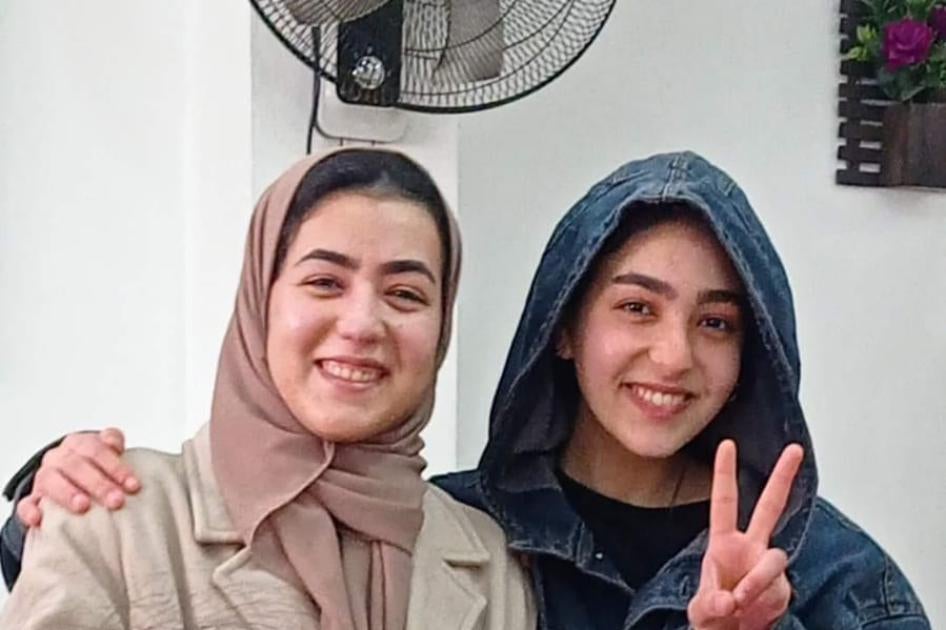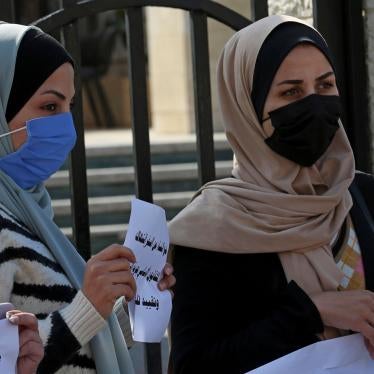(Gaza) – Gaza authorities should urgently ensure the safety and freedom of two adult sisters reported to be in forced confinement at the hands of their father and at risk of serious harm since their forcible return a month ago, Human Rights Watch said today.
The two women, Wissam al-Tawil, 23, and Fatma al-Tawil, 19, have previously said that they escaped their father several times, including as recently as September 2022, and they reported their abuse to the authorities, human rights organizations, and on social media. However, on January 5, 2023, the police arrested the women several days after their father and two relatives reported them missing. The police forcibly placed them under a relative’s control, who took them to their father. The two have not been heard from since January 6. On February 3, pictures were posted on social media accounts of the father and other people connected to him, of several relatives visiting with the two women and their father. However, reliable sources confirmed to Human Rights Watch that the women remain confined to the sixth floor of their father’s apartment building in Rafah without their phones or other means of communication.
“Pictures of two women with their family a month after the police in Gaza tracked them down and forcibly returned them to their family, who they previously fled from after reporting severe domestic violence, including death threats, is not enough to assure the world that they are free, safe, and their lives are no longer at risk,” said Rothna Begum, senior women’s rights researcher at Human Rights Watch. “Hamas authorities in Gaza should urgently ensure the two women’s safety and freedom of movement, including that they are able to leave their father’s home to a safe place of their choosing, and speak freely and independently about their situation.”
Human Rights Watch had been in regular contact with Wissam al-Tawil between September 2022 until her forcible return in January. Human Rights Watch also interviewed five people, including relatives, who were in contact with the women, and reviewed photographs, videos, and social media posts to corroborate the sisters’ accounts.
The interior ministry issued two statements on August 31 and September 8, 2022, reporting on how they sought to “resolve the dispute” involving the women. In October, Human Rights Watch wrote to the Ministry of Social Development in Gaza about the imminent risk to the two women’s lives and physical integrity and requested information about the authorities’ steps to investigate their reports of abuse, assist the women, and ensure their protection. The authorities should take measures to protect and support them, Human Rights Watch said at the time. That should include properly investigating their complaints, ensuring they have access to the outside world and their phones while staying at a government shelter, and the ability to move around or leave the territory freely.
While the authorities did not respond to requests to clarify what measures they took, on November 3, a senior ministry official replied via WhatsApp that the authorities “are trying to remedy the matter in a mutually satisfactory manner that aims for family reunification.”
Wissam told Human Rights Watch that she and her sister endured violence by their father following his return to Gaza in 2019 after 12 years away. She said that in 2019, her father beat Fatma, including by throwing a TV at her, for leaving the house without his permission, and after Wissam tried to protect her, he locked them up in separate rooms on the sixth floor of their building for 35 days. She said that each of them was given a mattress, pillow, and blanket, received only one meal a day, and was only allowed to leave the room to use the toilet twice a day. When he finally released them, she said, he threatened to hang them if they did anything to upset him.
Wissam said that on August 15, 2022, he locked her inside a room for seven days. Fatma immediately reported this to the police, and repeatedly asked them for help, but they only came a week later. She said their father justified his abuse to the police by falsely claiming she was “mentally ill.” Even though Wissam told officers he had imprisoned her for a week, the police decided he would not harm her and left.
Wissam said, on August 26, her father told her and Fatma that they “will definitely die” and asked them to choose “the easiest way.” She said he left them in a room on the sixth floor of their building with a gas cylinder and encouraged them to take their own lives. “I told myself that we are already dead, we can try to jump and escape,” Wissam said, which they did by jumping out the window onto the fifth-floor balcony below and going into hiding. On August 29, they said they went to a shelter operated by a nongovernmental group and gave detailed accounts of their abuse to the authorities.
On August 31, the interior ministry published its statement that the police worked with the family to find solutions to the “social problem between the father and his daughters” and that the women had decided to return to their family. Wissam said they had left the shelter that day with a relative who signed an agreement with officials not to hand them back to their father. However, the women said on September 6 their father forced them to return to his apartment which is in the same building as their relative’s after severely beating and threatening to kill them. Wissam said their father’s apartment, where he already had a gun, was “full of weapons, more than before: a Kalashnikov, grenades.” She said her father threatened to kill them. “I felt we would die soon,” she said.
The sisters said on September 8, they escaped yet again and went to the police, where they reported the abuse and showed the physical marks of their beatings, and photos of weapons that their father had inside their house. The interior ministry issued a statement expressing their “surprise” that the women left the family home again reporting to the police their father’s continued abuse. The police then transferred them to a temporary government shelter because the women’s family “could not control the dispute.” Wissam said they moved to stay at a relatives’ house on September 16, and were granted police protection while there.
Videos were posted on the women’s father’s social media accounts dating back to August, including Facebook Live, where he accused relatives, women’s rights groups, and others who had helped the women, of kidnapping them. While Facebook blocked his account, multiple new Facebook accounts were created where he continued to appear in videos making similar claims and harassing people assisting the women. Their father also claimed in videos, reviewed by Human Rights Watch, that, it was no one’s business if he killed his daughters and that he would only be sentenced to six months in jail if he did.
Women’s rights groups and activists reported receiving threats from various people in Gaza for assisting the women. On September 29, the Palestinian NGOs Network (PNGO), a coalition of Palestinian nongovernmental organizations, called on the authorities to protect groups defending the rights of women in Gaza. Wissam told Human Rights Watch that their relative was under pressure to hand them back to their father: “We are not stable in any specific place. We are not even independent when it comes to our own decisions.”
On September 25, Wissam said the police transferred them back to a government shelter. However, on November 12, she said the police “dragged them” out of the government shelter and sent them to a relative, who locked them in a room for 48 hours. The women said they fled and went into hiding, moving from place to place for fear of being found and returned to their father. In mid-December, the women met with the authorities to discuss their situation.
A relative told Human Rights Watch that the women’s father and two relatives had reported the women missing to the police in early January. Days later, on January 5, the police arrested the two women and forcibly handed them to a relative who drove them to their father in Rafah, in southern Gaza, where their father lived. By midnight, they had messaged several people, including Amnesty International staff, that they were handed over to their father and were at his house. “We are at our father’s house; he will send us over to the sixth floor in a bit. We are doomed,” one of the sisters messaged Amnesty International.
On February 3, pictures were posted on social media accounts of the father and other people connected to him, of several relatives visiting with the two women and their father that day. A relative confirmed to Human Rights Watch that the pictures are new. They, however, stated that the women otherwise remain confined to the sixth floor without their phones or other means of communication.
Authorities in Gaza are obligated to exercise due diligence to prevent gender-based violence and to investigate and punish such acts of violence under international human rights law, including international conventions that are binding on Palestine.
The Palestinian Authority, which manages affairs in parts of the West Bank, has repealed or amended some legal loopholes in the penal codes for both West Bank and Gaza in 2011 and 2019 to prohibit reduced sentences for serious crimes against women and children. However, a draft Family Protection Law has remained under consideration by the Palestinian Authority for several years, while Hamas authorities in Gaza have not taken any steps to bolster laws to effectively protect women from domestic violence.
“Hamas authorities in Gaza have displayed a shocking response that ultimately prioritized family reconciliation over protecting the sisters, even after providing the women with shelter,” Begum said. “Hamas authorities should investigate the women’s complaints of their father’s violence against them, as well as authorities’ actions that endangered the women. Palestinian authorities should also pass and enforce a domestic violence law that meets international standards to prevent this from happening again.”








